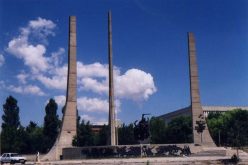Ağrı

Agrı
The city of Agri, situated on the eastern border of Turkey, has in history acted as a passage, as well as a stopping point for migrations from Asia to Anatolia. Today as well, the road passing through Dogubeyazit continues on through the border post at Gurbulak and into Iran. This region, which has come respectively under the Hurri, Urartu, Armenian, Persian, Arabian, Byzantine, Seljukian and Ottoman sovereignties, is the highest place in Turkey. Its name comes from the world famous Mount Ararat, called Agri Dagi in Turkish.
Agri Dagi is Turkey’s highest mountain. It is 30 km diameter on the ground offers magnificent views. It is a volcanic mountain; the summit is covered with sulphur. Consequently, it maintains a constant heat, and snow is unable to settle there. However, the section starting just below the summit and about 1,000 m lower down, is always covered with snow. Turkey’s biggest glacier is found here as well. To the south-east of Agri Dagi is Kucuk (Small) Agri Dagi with a height of 3,896 m; it rises from a base adjacent to Agri Dagi. The summit of Agri Dagi was first reached by Frederic Parrot in 1829. After this date, the mountain has attracted people from all around the world, who try to find remains of Noah’s Ark. Sensational news about Noah’s Ark having been found, has always aroused interest in most people. Some of the people who claim to have found evidence of the Ark are the Russians. It is said that, during World War I a pilot located the Ark and, upon the orders of the Tzar, the Russians climbed the mountain and photographed the 1,200 m long ship, but these documents were lost during the Russian Revolution.
Selamlik Section: The Selamlık section of the palace is where male servants (cooks, servants, chamberlains, coachman, clerks) lived and hosted male guests. It is entered through the door on the right side of the courtyard. Seven steps lead to a long corridor. The four old wooden cantilever beams, with their symbolic carvings, were removed and placed facing the Urartian artefacts. The top face of the beams have carved eagle figures, while the lower faces have lions, and the butt ends have human heads. The Selamlık section includes a mosque and four other rooms.
Ishak Pasha Palace (Turkish: Ishak Pasa Sarayi) is a semi-ruined palace and administrative complex located in the Dogubeyazit district of Agri province of eastern Turkey. The Ishak Pasha Palace is an Ottoman-period palace whose construction was started in 1685 by Colak Abdi Pasha, the bey of Beyazit province, continued by his son Ishak Pasha and completed by his grandson Mehmet Pasha. According to the inscription on its door, the Harem Section of the palace was completed by his grandson Ishak (Isaac) Pasha in 1784.
Tomb of Ahmed-i Hani (Ahmad Khani) is considered consecrated ground for local people and for domestic tourists. Ahmed-i Hani (Ahmad Khani) was born in 1651, and was one of the most influential poets and philosophers of the region. He travelled all over Eastern Anatolia, studied Arabic, eloquence and religion, and also learned astronomy. His most famous book was the allegorical novel Mem-u Zin, and it is thought that he lectured at the mosque and madrasah in Ishak Pasha Palace. A manuscript suggests that he died in Dogubayazit in 1707. His tomb in Dogubayazit, near the Ishak Pasha Palace, has become a pilgrimage site.
Mount Ararat is a snow-capped, dormant volcanic cone in Turkey. It’s the highest peak in Turkey, and the entire Armenian plateau. Mount Ararat in Judeo-Christian tradition is associated with the “Mountains of Ararat” where, according to the book of Genesis, Noah’s ark came to rest
Write a Comment
Only registered users can comment.









